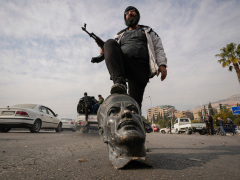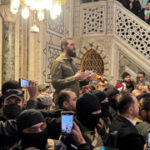On December 8, after a rapid offensive that lasted less than two weeks, Syrian opposition forces entered Damascus and declared the end of Bashar al-Assad’s regime. The Syrian president and his family are believed to have flown out in an unknown direction just before the rebels entered the capital.
The uprising against the Syrian government that ended the half-century of al-Assad family rule should be seen as among the most important political turning points in the modern Arab region since the end of World War II and the creation of Israel in 1948. It marks a definitive break with the legacy since the 1950s of military-anchored Arab autocrats who have long dominated and ravaged Arab societies.
Many rightly celebrate the overthrow of al-Assad, and many others wonder what will happen next given the involvement of various local and external powers in Syria. The Syrian people know they want a decent life, to be treated with respect and to be heard. We should humbly watch them bring a new and stable order to their country and stop the Western silliness of analysing what the length of a beard means or entertaining conspiracy theories.
It is critical now to reflect on what the devastating tale of Syrian governance and civil war mean. Syria under the Assads was neither unique nor the work of just a few local brutes. Rather, it is an example of the widespread legacy of heavy-handed, often vicious, Arab state power that has ravaged the region and demeaned its people for half a century, with the help of regional and great powers and assorted nongovernmental groups.
The al-Assad regime was the longest-lasting military-based, foreign-backed, and family-anchored autocratic government to dominate the Arab region, which devastated its people, economy, and national integrity.
The Syrian experience reveals all the debilitating hallmarks of shared Arab autocracy, which persist widely and must be systematically rooted out of our societies. These include a lack of genuine pluralism and accountability through credible participatory institutions; top-heavy rule anchored in military and police brutality, mass imprisonment, torture, and death; centralised economic planning that breeds corrupti




